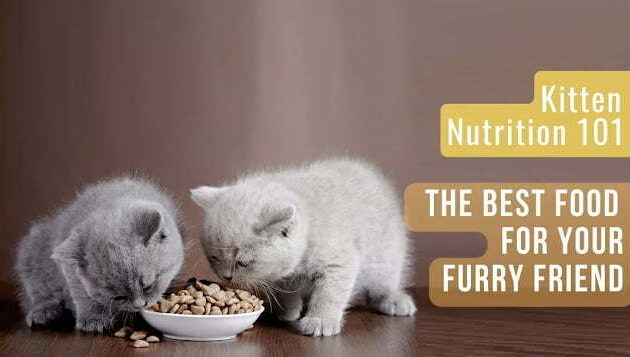Cats are obligate carnivores, which means they require animal protein to survive. Growing kittens require even more protein in their diet to support their rapid growth and development. In addition to protein, kittens also need a balance of essential nutrients, including vitamins, minerals, and fatty acids.
Providing your kitten with high-quality, nutritionally complete food is key to ensuring they receive all the nutrients they need. It’s important to look for kitten-specific food that is formulated with their unique needs in mind. These foods are designed to support healthy growth and development and usually have a higher protein content.
Choosing the right food for your kitten can also help prevent health problems later on in life. Feeding your kitten a diet that is high in protein and balanced in essential nutrients can help reduce the risk of obesity, diabetes, and other health issues.
Selecting the right food for your kitten is crucial for their overall health and well-being. As a responsible pet owner, it’s essential to choose a high-quality, nutritionally complete food that is designed specifically for growing kittens.
Kitten Nutrition: Key Nutrients and Ingredients to Look For
Understanding what nutrients your kitten needs to thrive is crucial when choosing the right food for them. As with human babies, kittens require special nutrition to support their growth and development.
High-quality ingredients are the building blocks of a healthy diet for your kitten. Look for foods that have real, whole ingredients like meat, fish, or poultry. Avoid foods that have a long list of artificial flavors, colors, and preservatives.
Protein and Fat Requirements for Growing Kittens
Protein is one of the most important nutrients for kittens. It helps them build and maintain their muscles, skin, and fur. Look for foods that contain at least 30% protein.
Fat is also essential for kittens. It provides them with energy and helps them absorb vitamins. Choose foods that have at least 15% fat.
Vitamins and Minerals Necessary for Healthy Development
Vitamins and minerals are essential for your kitten’s overall health and development. Look for foods that contain a balance of vitamins and minerals, including:
- Calcium: important for strong bones and teeth
- Vitamin A: essential for healthy eyesight and a strong immune system
- Vitamin E: helps maintain healthy skin and fur
- Iron: necessary for the formation of red blood cells
By choosing foods that are high in protein, fat, vitamins, and minerals, you can help your kitten grow into a healthy adult cat. Remember to read labels carefully and consult with a veterinarian or pet nutritionist if you have any concerns about your kitten’s diet.
Best Dry Kitten Foods for Healthy Growth and Development
Choosing the right dry kitten food can be overwhelming, but it’s important to make sure your kitten is getting all the nutrients they need for healthy growth and development. Here are two of the best dry kitten foods on the market today:
1. Hill’s Science Diet Kitten Dry Cat Food
Hill’s Science Diet Kitten Dry Cat Food is specially formulated to meet the nutritional needs of growing kittens. It contains high-quality protein to support muscle growth and a blend of antioxidants to support a strong immune system. Additionally, this food contains natural ingredients like chicken and brown rice to provide your kitten with the balanced nutrition they need.
2. Purina ONE Healthy Kitten Formula
Purina ONE Healthy Kitten Formula is another great option for growing kittens. This food is made with real chicken and contains a balance of protein, fat, and other essential nutrients to support healthy development. It also contains DHA, which is essential for brain and vision development.
When choosing dry kitten food, look for options that contain high-quality protein, natural ingredients, and a balance of vitamins and minerals. Always read the label and choose foods that are specifically formulated for kittens.
Hill’s Science Diet Kitten Dry Cat Food and Purina ONE Healthy Kitten Formula are both excellent options for growing kittens. They contain high-quality ingredients and a balance of essential nutrients to support healthy growth and development.
Best Wet Kitten Foods for Optimal Health and Immunity Support
Wet kitten food is an excellent way to provide your kitten with the moisture they need to stay hydrated and support their overall health. Here are two of the best wet kitten foods on the market today:
1. Royal Canin Feline Health Nutrition Kitten Canned Cat Food
Royal Canin Feline Health Nutrition Kitten Canned Cat Food is a great option for supporting your kitten’s optimal health and immunity. This food is made with high-quality protein and a balance of essential vitamins and minerals to support healthy development. It also contains a blend of antioxidants to support your kitten’s immune system, which is especially important during the early stages of life.
2. Wellness Complete Health Kitten Formula Grain-Free Canned Cat Food
Wellness Complete Health Kitten Formula Grain-Free Canned Cat Food is another excellent option for wet kitten food. It contains high-quality protein, essential fatty acids, and a blend of vitamins and minerals to support healthy growth and development. This food is grain-free, which means it’s an excellent option for kittens with food sensitivities or allergies.
When choosing wet kitten food, look for options that contain high-quality protein, essential nutrients, and a balance of vitamins and minerals. Always read the label and choose foods that are specifically formulated for kittens.
Royal Canin Feline Health Nutrition Kitten Canned Cat Food and Wellness Complete Health Kitten Formula Grain-Free Canned Cat Food are both excellent options for wet kitten food. They contain high-quality ingredients and a balance of essential nutrients to support healthy growth and development.
Raw Kitten Food: Pros and Cons
Raw diets for kittens have become increasingly popular in recent years. However, it’s important to consider the pros and cons before deciding if it’s the right choice for your furry friend.
Benefits of a raw diet for kittens
A raw diet for kittens can provide numerous benefits, including:
- Better digestion: A raw diet can be easier for kittens to digest, which can result in smaller and firmer stools.
- Healthier coat and skin: A raw diet is often rich in fatty acids, which can help improve your kitten’s coat and skin health.
- Improved energy: Many raw diets are high in protein and other nutrients, which can help support your kitten’s growth and development and give them plenty of energy.
- Stronger immune system: A raw diet can also help support your kitten’s immune system and reduce the risk of illness.
Risks and potential drawbacks of a raw diet
While there are many potential benefits to a raw diet, there are also several risks and potential drawbacks to consider, such as:
- Increased risk of illness: Raw food may contain harmful bacteria and pathogens, such as Salmonella and E. coli, that can make your kitten sick.
- Difficulty balancing nutrients: It can be challenging to ensure your kitten is getting all the necessary nutrients on a raw diet, which could lead to nutrient deficiencies or imbalances.
- Cost: Raw food can be more expensive than other types of kitten food, which may not be feasible for all pet owners.
- Time-consuming: Preparing a raw diet for your kitten can be time-consuming and require a significant amount of planning.
While a raw diet for kittens can provide numerous benefits, it’s important to consider the potential risks and drawbacks before deciding if it’s the right choice for your furry friend.
Consult with a veterinarian or pet nutritionist to determine if a raw diet is appropriate for your kitten, and always ensure that any raw food you feed your kitten is safe and properly balanced to meet their nutritional needs.
Homemade Kitten Food: Is It a Good Choice?
As a kitten owner, you may be considering homemade kitten food as an alternative to store-bought options. While there are some benefits to this option, it’s important to understand the advantages and disadvantages before deciding if it’s the right choice for your kitten.
One of the main advantages of homemade kitten food is that you have complete control over the ingredients and can ensure that your kitten is getting high-quality, nutritious food. Additionally, homemade food can be more appealing to picky eaters, and you can vary the recipes to prevent boredom.
However, there are also some potential drawbacks to homemade kitten food, including the risk of nutrient deficiencies or imbalances if the food isn’t properly formulated. Additionally, it can be time-consuming and may not be cost-effective for all pet owners.
Essential ingredients for homemade kitten food
If you’re considering homemade kitten food, it’s important to include all the necessary nutrients for your kitten’s growth and development. Some essential ingredients to include in homemade kitten food are:
- High-quality protein sources: Kittens require a lot of protein for healthy growth and development. Consider lean meats like chicken, turkey, or fish.
- Carbohydrates: Whole grains like brown rice, quinoa, or oats can provide the necessary energy for your kitten.
- Fruits and vegetables: These can provide essential vitamins and minerals. However, it’s important to avoid foods that are toxic to cats like onions, garlic, and avocado.
- Fatty acids: Fatty acids like omega-3s and omega-6s can help support your kitten’s coat and skin health. Consider adding fish oil or flaxseed to the recipe.
Homemade kitten food can be a good choice for some pet owners, but it’s important to consider the potential advantages and disadvantages before deciding if it’s the right option.
Always ensure that any homemade kitten food you feed your furry friend is properly balanced and meets their nutritional needs. Consult with a veterinarian or pet nutritionist to ensure that your kitten is getting all the necessary nutrients for healthy growth and development.
Common Cat Food Ingredients to Avoid
When choosing cat food for your kitten, it’s important to pay attention to the ingredients list and avoid certain ingredients that may not be beneficial for your pet’s health. Here are some common cat food ingredients to avoid:
1. Fillers and by-products
Fillers like corn, wheat, and soy can be used to bulk up cat food, but they don’t provide much nutritional value for your kitten. By-products are another ingredient to avoid, as they may contain low-quality parts of the animal like beaks and feet.
2. Artificial preservatives and colors
Artificial preservatives like BHA, BHT, and ethoxyquin can be used to extend the shelf life of cat food, but they may have negative health effects on your kitten. Artificial colors can also be added to cat food for aesthetic purposes, but they provide no nutritional value and may be harmful to your pet’s health.
3. Unhealthy additives
Some cat foods contain additives like carrageenan, which is a thickener that has been linked to inflammation in the digestive tract. Additionally, some cat foods may contain excessive amounts of salt, which can lead to dehydration and other health issues.
By avoiding fillers and by-products, artificial preservatives and colors, and unhealthy additives, you can help ensure that your kitten is getting high-quality, nutritious food that supports their growth and development.
Always read the ingredients list and choose cat food that contains high-quality, whole-food ingredients that provide your pet with the nutrients they need to thrive.
Conclusion
Choosing the right food for your kitten is crucial to ensuring their overall health and well-being. Kittens have specific nutritional needs that are essential for their growth and development, and it’s important to choose food that provides the necessary nutrients.
It’s important to note that every kitten is unique and may have different nutritional requirements. It’s always a good idea to do your own research and consult with your veterinarian to determine the best food for your kitten’s individual needs.
Choosing the right food for your kitten is one of the most important decisions you can make as a pet owner. By selecting high-quality, nutritious food that meets your kitten’s specific needs, you can help ensure their overall health and well-being for years to come.
FAQs
How much food should I feed my kitten?
The amount of food your kitten needs depends on their age, weight, and activity level. Your veterinarian can provide recommendations based on your kitten’s individual needs.
Can I feed my kitten adult cat food?
No, kittens have specific nutritional needs that differ from adult cats, and their food should be specifically formulated for their growth and development.
Can I mix dry and wet food for my kitten?
Yes, it’s possible to mix both types of food for your kitten, as long as you provide the necessary nutrients in their diet.
Should I avoid all fillers and by-products in my kitten’s food?
While some fillers and by-products can be unhealthy for your kitten, not all of them are bad. It’s important to read labels and do your own research to determine which ingredients are best for your kitten’s individual needs.
Is homemade kitten food a good choice?
Homemade kitten food can be a good choice if it’s properly balanced and provides all the necessary nutrients. However, it’s important to consult with your veterinarian and do thorough research before making homemade kitten food.


